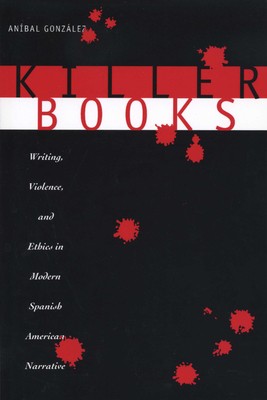
- We will send in 10–14 business days.
- Author: AnÃbal González
- Publisher: University of Texas Press
- ISBN-10: 029271808X
- ISBN-13: 9780292718081
- Format: 15.2 x 22.9 x 1.1 cm, minkšti viršeliai
- Language: English
- SAVE -10% with code: EXTRA
Reviews
Description
Writing and violence have been inextricably linked in Spanish America from the Conquest onward. Spanish authorities used written edicts, laws, permits, regulations, logbooks, and account books to control indigenous peoples whose cultures were predominantly oral, giving rise to a mingled awe and mistrust of the power of the written word that persists in Spanish American culture to the present day. In this masterful study, AnÃbal González traces and describes how Spanish American writers have reflected ethically in their works about writing's relation to violence and about their own relation to writing. Using an approach that owes much to the recent turn to ethics in deconstruction and to the works of Jacques Derrida and Emmanuel Levinas, he examines selected short stories and novels by major Spanish American authors from the late nineteenth through the twentieth centuries: Manuel Gutiérrez Nájera, Manuel Zeno GandÃa, Teresa de la Parra, Jorge Luis Borges, Alejo Carpentier, Gabriel GarcÃa Márquez, and Julio Cortázar. He shows how these authors frequently display an attitude he calls graphophobia, an intense awareness of the potential dangers of the written word.
EXTRA 10 % discount with code: EXTRA
The promotion ends in 22d.18:55:45
The discount code is valid when purchasing from 10 €. Discounts do not stack.
- Author: AnÃbal González
- Publisher: University of Texas Press
- ISBN-10: 029271808X
- ISBN-13: 9780292718081
- Format: 15.2 x 22.9 x 1.1 cm, minkšti viršeliai
- Language: English English
Writing and violence have been inextricably linked in Spanish America from the Conquest onward. Spanish authorities used written edicts, laws, permits, regulations, logbooks, and account books to control indigenous peoples whose cultures were predominantly oral, giving rise to a mingled awe and mistrust of the power of the written word that persists in Spanish American culture to the present day. In this masterful study, AnÃbal González traces and describes how Spanish American writers have reflected ethically in their works about writing's relation to violence and about their own relation to writing. Using an approach that owes much to the recent turn to ethics in deconstruction and to the works of Jacques Derrida and Emmanuel Levinas, he examines selected short stories and novels by major Spanish American authors from the late nineteenth through the twentieth centuries: Manuel Gutiérrez Nájera, Manuel Zeno GandÃa, Teresa de la Parra, Jorge Luis Borges, Alejo Carpentier, Gabriel GarcÃa Márquez, and Julio Cortázar. He shows how these authors frequently display an attitude he calls graphophobia, an intense awareness of the potential dangers of the written word.


Reviews